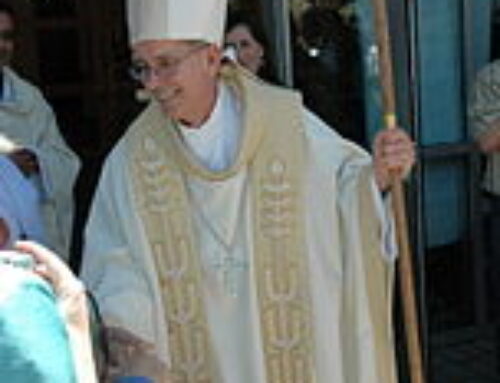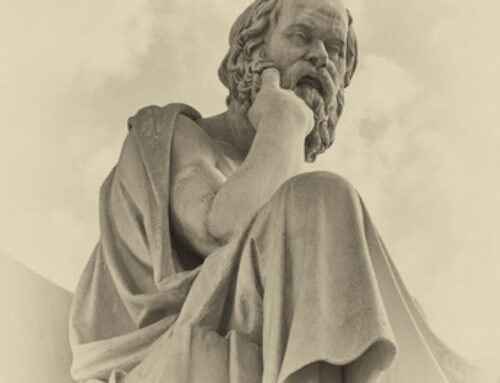
At first I wondered if I was sitting in a Catholic Church or a Deist Temple. I looked around to check the man’s vestments, the tabernacle, and the statues for confirmation—yes, it was a Catholic Church.
Not content with a single declaration of his message on prayer, the priest repeated it several times: God can’t change His mind or alter events, so He can’t intervene in answer to your prayers.
As he continued speaking, the image began forming in my mind of a man who had accidentally wandered into a swamp, stepped into quicksand, and was flailing helplessly as he sank deeper and deeper into the muck. I was about to offer a silent prayer for the hapless denizen of my imagination—“Please save him Lord”—but then wondered if that would be immature of me.
Ironically, this homily was delivered on the 29th Sunday of Ordinary Time. The first reading that day, Exodus 17:8-13, told of Moses holding his staff high while the Lord enabled Joshua to slay Amalek and his men; the Responsorial Psalm (121), proclaimed “The Lord will guard you from all evil; he will guard your life. The Lord will guard your coming and your going, both now and forever”; and the Gospel was Luke 18, which begins “Then Jesus told his disciples a parable to show them that they should always pray and not give up.”
If the homilist was right, then the readings for the 29th Sunday (and virtually every other Sunday) are nonsensical. Even more nonsensical are the Old and New Testaments from which the readings were selected because they encourage praying for Aunt Louise, one’s prodigal son, and innumerable other intentions. For example:
Mark 10:27: “Jesus looked at them and said, ‘With man it is impossible, but not with God. For all things are possible with God.’” Mark 11:24: “Therefore I tell you, whatever you ask in prayer, believe that you have received it, and it will be yours.” John 14:14: “If you ask me anything in my name, I will do it.” Matt 7:7 and Luke 11:9 “Ask, and it will be given to you; seek, and you will find; knock, and it will be opened to you.” James 1:5 “If any of you lacks wisdom, let him ask God, who gives generously to all without reproach, and it will be given him.” James 5:14: “Is anyone among you sick? Let him call for the elders of the church, and let them pray over him, anointing him with oil in the name of the Lord.”
The homilist’s assertion is even more mischievous that I have shown. Taken to its logical extension, it means that miracles are impossible, in which case we should reject the account of Jesus changing water into wine at the marriage feast at Cana (John 2) and that of His raising of Lazarus from the dead (John 11), as well as the miraculous freeing of Paul and Lazarus from prison (Acts 16). Of course, to reject all these accounts and to deny the efficacy of prayer is to reject the power of prayer and thus, in effect, to abandon the virtue of hope.
The homilist’s denial of the efficacy of prayer put him at odds with both Scripture and Catholic teaching. The Church holds that God is both immutable (unchanging) and omnipotent (all-powerful without limitation) and that the two are not mutually exclusive.
In fairness to the homilist we must acknowledge that the issue of God’s nature is confounding. We humans are bound by time and space and can understand action and inaction, sin and virtue, alienation from God and reconciliation, only within that limiting framework. We can never fully understand what it means to be beyond time and space, let alone what it means to be the Creator of time and space and everything that exists within them.
Our efforts to understand God are both natural and praiseworthy, but our language is often unequal to the task and can lead us into the metaphorical “quicksand” I referred to earlier, rather than to insight. The homilist’s problem was the word “immutable,” which can two very different meanings, one suggesting strength—consistency, constancy, dependability; the other suggesting weakness—inflexibility, incapacity, powerlessness. The homilist confused the two meanings and focused on the one that limits God.
It is wise to remember that our difficulty grasping why some prayers are answered, and others seem not to be, is attributable to our human limitation, not to any lack of compassion in God or to the inadequacy of our prayers.
Although the homilist was mistaken in contending that “Thy will be done” should be our only prayer, he was right in stressing its importance. We do well appending it to every prayer in acknowledgement that God’s wisdom and love are beyond our capacity to understand and that our trust in His goodness should be unceasing.
Copyright © 2019 by Vincent Ryan Ruggiero. All rights reserved


